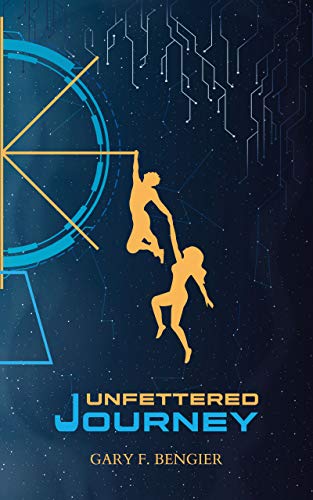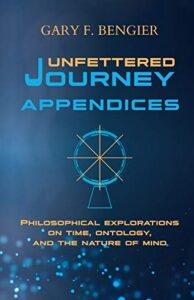
Unfettered Journey received a 4+ star review, making it an IndieReader Approved title.
Following find an interview with author Gary F. Bengier.
What is the name of the book and when was it published?
Unfettered Journey, published September 7, 2020
What’s the book’s first line?
It was time to embrace his freedom. His first act was ending with her.
[Best to give you two lines, to set up the surprise meaning properly. Yes, there’s already a twist.]
What’s the book about? Give us the “pitch”.
Some have said it is “West World meets The Hunger Games,” with a spiritual perspective. Set in a richly envisioned future world, Unfettered Journey is the story of an AI scientist who seeks to create robot consciousness and discovers the resilience of the human spirit. He travels to a small college to progress his quest, but instead finds love, a secret plot by unjust forces, and the answers to his fundamental questions—the nature of the conscious mind and free will.
This book is a profound, many-layered journey. It is a love and adventure story, tracing struggle and resilience in an imperfect world. It is a deep philosophical exploration, challenging you to begin your own journey to a purposeful life.
What inspired you to write the book? A particular person? An event?
Remember “42” from The Hitchhiker’s Guide to the Galaxy? That is the answer to the question about the so-called Ultimate Question of Life, the Universe, and Everything (posed by aliens who created a supercomputer, that churned for 10 million years). Yes, it is a cornball joke. But I’ve been fascinated by the big questions and trying to find those answers inspired me to write Unfettered Journey—to share that journey with others. That is why after a full career focused on daily living, I went back to earn a master’s in philosophy. (Spoiler alert—that may be why my main character, Joe, is a “Level 42.”) We want to answer those big questions, to find meaning and purpose in our lives.
What’s the main reason someone should really read this book?
Readers will love the story and characters, and Unfettered Journey will leave them contemplating their own life long after closing on the last page. If a reader is willing to be challenged by a cross genre novel—not only science fiction, or a love story, or an action-adventure story, but a blend for the thoughtful person—then Unfettered Journey’s multiple themes and “jaw dropping ending” (as one critic said) will leave them asking questions about themselves and their “thin sliver of time” to spend in this life.
What’s the most distinctive thing about the main character? Who-real or fictional-would you say the character reminds you of?
Unfettered Journey follows an AI scientist in the year 2161—Joe—who seeks to create robot consciousness. The book is told in third person POV, even as it is seen from Joe’s exclusive perspective, with Joe’s first-person thoughts informing the scene. The reader might almost reside inside Joe’s head, and we can all be Joe. That is unique about the novel. Of course, one theme is human consciousness, that “I” that is us.
Because of the first-person perspective, of a young person confused about his future direction, and the deep questions that the novel asks, one might be reminded of a mixture of Holden Caulfield (The Catcher in the Rye), Marcus Aurelius (Meditations), and perhaps Luke Skywalker.
What do you do for work when you’re not writing?
I had a successful career in Silicon Valley, were I was fortunate to work in companies in many of the leading technologies, including bioscience, chip design, computer peripherals, and the Internet. The experience informs my hard-science view of the future. I was CFO at eBay and took the company public. I am proud that before I retired from eBay, we had created a million jobs for people making a living out of their own living rooms.
After a career in Silicon Valley I turned to passion projects. I went back to school for nearly a decade, studying physics and philosophy. My philosophy master’s thesis led me deep into the philosophy of mind, to try to understand human consciousness, and what our minds actually are. After nearly another decade of thinking about these questions, I’ve written both a rigorous philosophical book—Unfettered Journey Appendices—and the more accessible novel, Unfettered Journey. There is deep philosophy underpinning the book.
Now I see my “job” as getting these ideas in front of as many people as I can. Many of the themes and questions raised in the novel are relevant to us today. As one example, I raise the question: Can we square a scientific perspective with any spiritual system?
What’s the best and the hardest part of being an indie?
The best part is that I can decide to take my novel anywhere I wish. So, for example, I have already begun translations into multiple languages, and expect to have editions in French (launching in November), Italian (launch in December), Japanese, and German.
The hardest part is the learning curve for marketing across multiple platforms (Amazon, Google, YouTube, and many others), and now in several countries. But that also is the challenge, and the joy, to get my novel’s ideas in front of as many minds as I can.
What’s a great piece of advice that you can share with fellow indie authors?
I don’t believe that the Muse suddenly delivers any masterpiece into your head. But if you work smartly, then perhaps she will bless you with small creative sparks. First, plan your story well, so that it begins with a focused structure. You need to know where you are going to ever get anywhere. Then invest the time to write. Measure your progress. And write. When your first draft is complete, perfect you may believe, then spend five times longer in editing than you imagined. Listen with an open mind to all your editors. But remember that you own it. Don’t let anyone have the final say on your story.
Would you go traditional if a publisher came calling? If so, why?
I would not, and I intentionally chose to ignore the traditional publishing route. The earthquake that rocked traditional publishing – Amazon and Internet social media changing the book distribution model and the marketing – still seems to not be well understood by traditional publishers, who haven’t mastered digital marketing. The traditional gatekeepers have lost their status. Great editors can be found working independently. Perhaps the top quartile of Indie books rival those offered by traditional publishers. Those Indie authors are not bound by pure profit motives and can introduce their creative works to their unique audiences. It takes work to figure out the productive marketing levers, but the Indie author has time to find her audience.
Which writer, living or dead, do you most admire?
I’m still a fan of the classic canon, even with the obvious faults (from our retrospective view) in many of those books—writers like Faulkner, Hemingway, and Flaubert with Madame Bovary. The science fiction classics inspired me from a young age, including everything from Asimov, Huxley’s Brave New World, and Herbert’s Dune.
Looking over that list, my favorite author is Faulkner. His themes are universal, reminding us that humankind will not only endure, but can prevail over our imperfect world. His characters are timeless, and his prose often soars.

